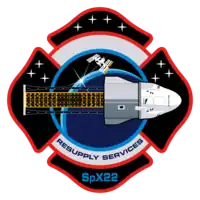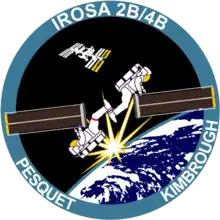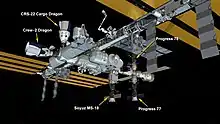SpaceX CRS-22
SpaceX CRS-22, also known as SpX-22, was a Commercial Resupply Services (CRS) mission to the International Space Station (ISS) that launched at 17:29:15 UTC on 3 June 2021.[1] The mission is contracted by NASA and is flown by SpaceX using a Cargo Dragon 2. This is the second flight for SpaceX under NASA's CRS Phase 2 contract awarded in January 2016.
.jpg.webp) CRS-22 Cargo Dragon approaching the ISS | |
| Names | SpX-22 |
|---|---|
| Mission type | ISS resupply |
| Operator | SpaceX |
| COSPAR ID | 2021-048A |
| SATCAT no. | 48831 |
| Website | https://www.spacex.com/ |
| Mission duration | 36 days, 9 hours, 59 minutes |
| Spacecraft properties | |
| Spacecraft | Cargo Dragon C209 |
| Spacecraft type | Cargo Dragon |
| Manufacturer | SpaceX |
| Launch mass | 6,000 kg (13,000 lb) |
| Payload mass | 3,328 kg (7,337 lb) |
| Dimensions | 8.1 m (27 ft) (height) 4 m (13 ft) (diameter) |
| Start of mission | |
| Launch date | 3 June 2021, 17:29:15 UTC[1] |
| Rocket | Falcon 9 Block 5 (B1067.1) |
| Launch site | Kennedy Space Center, LC-39A |
| Contractor | SpaceX |
| End of mission | |
| Recovered by | GO Navigator (Shannon) |
| Landing date | 10 July 2021, 03:29 UTC |
| Landing site | Gulf of Mexico |
| Orbital parameters | |
| Reference system | Geocentric orbit |
| Regime | Low Earth orbit |
| Inclination | 51.66° |
| Docking with ISS | |
| Docking port | Harmony zenith |
| Docking date | 5 June 2021, 09:09 UTC |
| Undocking date | 8 July 2021, 14:45 UTC |
| Time docked | 34 days, 5 hours, 36 minutes |
| Cargo | |
| Mass | 3,328 kg (7,337 lb) |
| Pressurised | 1,948 kg (4,295 lb) |
| Unpressurised | 1,380 kg (3,040 lb) |
 SpaceX CRS-22 mission patch | |
Cargo Dragon
SpaceX plans to reuse the Cargo Dragons up to five times. Since it does not support a crew, the Cargo Dragon launches without SuperDraco abort engines, seats, cockpit controls or the life support system required to sustain astronauts in space.[2][3] Dragon 2 improves on Dragon 1 in several ways, including lessened refurbishment time, leading to shorter periods between flights.[4]
The new Cargo Dragon capsules under the NASA CRS Phase 2 contract splash down under parachutes in the Gulf of Mexico rather than the previous recovery zone in the Pacific Ocean west of Baja California under the NASA CRS Phase 1 contract.[2][4]
Mission
Timeline
T+00:00: Liftoff
T+01:15: Maximum aerodynamic pressure
T+02:30: First stage main engine cutoff (MECO)
T+02:34: Stage separation
T+02:41: Second stage engine start
T+02:48: First stage Boostback Burn
T+05:58: First stage entry burn begins
T+07:22: First stage landing burn
T+07:52: First stage landing on drone ship
T+08:46: Second stage engine cutoff (SECO)
T+11:58: Dragon separation
T+12:35: Dragon nose cone open sequence begins
Payload

NASA contracted for the CRS-22 mission from SpaceX and therefore determines the primary payload, date of launch, and orbital parameters for the Cargo Dragon.[5] The total mission payload is 3,328 kg (7,337 lb).
- Science investigations: 920 kg (2,030 lb)
- Vehicle hardware: 345 kg (761 lb)
- Crew supplies: 341 kg (752 lb)
- Spacewalk equipment: 52 kg (115 lb)
- Computer resources: 58 kg (128 lb)
- External payloads: 1,380 kg (3,040 lb) [6]
ISS Roll Out Solar Arrays (iROSA)
First pair of new roll-out solar arrays, namely, 2B and 4B; using XTJ Prime space solar cells, based on design tested at ISS in 2017. They will be delivered to the station in the unpressurized trunk of the SpaceX Cargo Dragon CRS-22 spacecraft. A second pair was delivered to the ISS on CRS-26 in late 2022, followed by another pair on CRS-28 due to be delivered in june 2023.[7][8] The installation of these new solar arrays requires two spacewalks: one to prepare the worksite with a modification kit, on 16 June 2021, and another to install the new panel, on 20 June 2021.[9]
Additional hardware carried internally includes:
- Catalytic Reactor: legacy unit launching to provide critical sparing support for the water production capability for the environmental control and life support system (ECLSS)
- Commercial Crew Vehicle Emergency Breathing Air Assembly (CEBAA) Regulator Manifold Assembly (RMA): completing the first set of emergency air supply capability, this integrated system supports as many as five crew members for up to 1 hour during an ISS emergency ammonia leak
- Zarya Kurs Electronics Unit: critical hardware for cosmonaut remote-control docking of Russian spacecraft is launching to support planned maintenance activity during 2021
- Potable Water Dispenser (PWD) Filter: major filter assembly used to remove iodine from water consumed by the crew during nominal operations
- Commercial off-the-shelf (COTS) Air Tanks: critical disposable air tanks to support gas resupply for routine cabin repress activities in-orbit
- Iceberg: critical cold stowage capability to support expanded payload operations [6]
Research
The new experiments arriving at the orbiting laboratory on the SpaceX CRS-22 mission supports science from human health to high-powered computing, and utilizes the space station as a proving ground for new technologies.[10]
Among the investigations arriving inside the Dragon's pressurized capsule will be a variety of research experiments and studies, including:
- Develop better pharmaceuticals and therapies for treating kidney disease on Earth
- Using cotton root systems to identify varieties of plants that require less water and pesticides
- Test new portable ultrasound technology in microgravity (Butterfly IQ Ultrasound)[11]
Two model organism investigations:
- One study will look at bobtail squid as a model to examine the effects of spaceflight on interactions between beneficial microbes and their animal hosts
- Second study will examine tardigrades' adaptation to the harsh environment of space, which could contribute to long-term problem solving for vaccine production, distribution, and storage on Earth
NASA Glenn Research Center studies:[12]
- Combustion Integration Rack (CIR) Reconfiguration
Student Spaceflight Experiments Program
The Student Spaceflight Experiments Program (SSEP) has five experiments manifested:
ISS United States National Laboratory
The ISS U.S. National Laboratory is sponsoring more than a dozen payloads with education and commercial partners.[15] These include:
- Colgate-Palmolive – oral biofilms investigation
- Eli Lilly – investigation to examine the effects of gravity on the physical state and properties of freeze-dried pharmaceutical products
CubeSats
ELaNa 36: One CubeSat is scheduled for deployment on this mission:[16]
- RamSat – Oak Ridge Public Schools (Robertsville Middle School), Oak Ridge, Tennessee
Nanoracks CubeSat deployments:
- SOAR – University of Manchester, United Kingdom and the DISCOVERER consortium with EU/EC Horizon 2020 funding.[17]
UNOOSA / JAXA KiboCUBE program:[18]
- MIR-SAT1 – Mauritius Research and Innovation Council (MRIC)[19]
- G-SATELLITE 2 – OneTeam, Tokyo Organising Committee of the Olympic and Paralympic Games (TOCOG)[20][21]
Returning hardware

Beginning with returning capsules or lifting bodies under the CRS-2 contract, NASA reports major hardware (failed or expended hardware for diagnostic assessment, refurbishment, repair, or no longer needed) returning from the International Space Station. The SpaceX CRS-22 mission ends on 10 July 2021, this is a two-day delay from the original undocking target of 6 July 2021 as a result of Tropical Storm/Hurricane Elsa causing weather concerns at the splashdown zones,[22] with re-entry into atmosphere of Earth and splash down in the Gulf of Mexico near the western coast of Florida with 2,404 kg (5,300 lb) of return cargo.
- Catalytic Reactor Developmental Test Objective (DTO): developmental environmental control and life support system (ECLSS) unit returning for testing, teardown, and evaluation (TT&E) to determine the cause of failure and subsequent re-flight
- Urine Processing Assembly (UPA) Distillation Assembly: critical ECLSS orbital replacement unit used for urine distillation, processing, and future use returning for TT&E and refurbishment to support future spares demand
- Sabatier Main Controller: major Sabatier system hardware used in conjunction with the Oxygen Generation System (OGS) for water production needs on-orbit
- Rodent Research Habitats (AEM-X): habitats used during Rodent Research missions returning for refurbishment to support future missions in early 2022
- Nitrogen/Oxygen Recharge System (NORS) Recharge Tank Assembly (RTA): empty gas tanks returning for reuse to support high-pressure gas operations and activities on-orbit [6]
Gallery
.jpg.webp) CRS-22 rolling out
CRS-22 rolling out.jpg.webp) Launch of CRS-22
Launch of CRS-22.jpg.webp) Cargo Dragon after splashdown
Cargo Dragon after splashdown
References
- Clark, Stephen (3 June 2021). "SpaceX cargo ship launches on mission to upgrade space station electrical grid". Spaceflight Now. Retrieved 3 June 2021.
- Audit of Commercial Resupply Services to the International Space Center (PDF). NASA Office of Inspector General (Report). Vol. IG-18-016. NASA. 26 April 2018. pp. 24, 28–30. Retrieved 29 September 2020.
 This article incorporates text from this source, which is in the public domain.
This article incorporates text from this source, which is in the public domain. - NASA OIG presentation. "Dragon 2 modifications to Carry Cargo for CRS-2 missions". Teslarati. Retrieved 17 February 2020.
- Clark, Stephen (2 August 2019). "SpaceX to begin flights under new cargo resupply contract next year". Spaceflight Now. Retrieved 29 September 2020.
- "SpaceX Commercial Resupply". ISS Program Office. NASA. 1 July 2019. Retrieved 27 September 2020.
 This article incorporates text from this source, which is in the public domain.
This article incorporates text from this source, which is in the public domain. - "CRS-22 Mission Overview" (PDF). NASA. 27 May 2021. Retrieved 1 June 2021.
 This article incorporates text from this source, which is in the public domain.
This article incorporates text from this source, which is in the public domain. - "Current and Future Operations and Challenges with International Space Station". ISS Program Office. NASA. 15 October 2020. Archived from the original (PDF) on 4 May 2021. Retrieved 2 May 2021.
 This article incorporates text from this source, which is in the public domain.
This article incorporates text from this source, which is in the public domain. - "Current and Future Operations and Challenges with International Space Station". ISS Program Office. NASA. 15 October 2020. Archived from the original (PDF) on 4 May 2021. Retrieved 19 August 2022.
- "New solar arrays ready to upgrade International Space Station's power grid". Spaceflight Now. 2 June 2021. Retrieved 2 June 2021.
- "NASA Invites Media to Next SpaceX Cargo Launch to Space Station" (Press release). NASA. 3 May 2021. Retrieved 23 May 2021.
 This article incorporates text from this source, which is in the public domain.
This article incorporates text from this source, which is in the public domain. - "NASA, Space X to launch second commercial crew rotation mission to International Space Station". NASA. 25 February 2021. Retrieved 26 April 2021.
 This article incorporates text from this source, which is in the public domain.
This article incorporates text from this source, which is in the public domain. - "ISS Research Program". Glenn Research Center. NASA. 1 January 2020. Retrieved 27 September 2020.
 This article incorporates text from this source, which is in the public domain.
This article incorporates text from this source, which is in the public domain. - SSEP Office (29 March 2021). "SSEP Mission 14 to the International Space Station (ISS)". NCESSE. Retrieved 23 May 2021.
- SSEP Office (29 March 2021). "SSEP Mission 15 to the International Space Station (ISS)". NCESSE. Retrieved 23 May 2021.
- "SpaceX CRS-22 to Launch Numerous Investigations Supported by Private-Sector Partners". 25 May 2021.
- "Hometown Heroes: Students Create Satellite Inspired by Gatlinburg Wildfires". Human Exploration and Operations Mission Directorate. NASA. 2 June 2021. Retrieved 2 June 2021.
 This article incorporates text from this source, which is in the public domain.
This article incorporates text from this source, which is in the public domain. - "Manchester scientists to launch low-orbiting satellite on SpaceX mission". Retrieved 1 June 2021.
- "KiboCUBE: Team from the Republic of Mauritius Selected for Third Round and Extension of KiboCUBE Cooperation Programme". JAXA. 19 June 2018. Retrieved 4 June 2021.
- "First Mauritian Satellite, MIR-SAT1 on its way to the ISS". MRIC. 3 June 2021. Archived from the original on 6 July 2021. Retrieved 4 June 2021.
- "Two CubeSats successfully deployed from "Kibo"!". JAXA. 25 June 2021. Retrieved 2 July 2021.
- "Пентагон разъяснил ситуацию с "секретно запущенным" с МКС спутником" [Pentagon clarifies situation with satellite "secretly launched" from the ISS] (in Russian). RIA Novosti. 2 July 2021. Retrieved 2 July 2021.
- "Cargo Dragon splashes down to complete SpaceX CRS-22 mission". NASASpaceflight.com. 8 July 2021. Retrieved 10 July 2021.
External links
- NASA
- SpaceX official page for the Dragon spacecraft Archived 12 April 2017 at the Wayback Machine

.jpg.webp)
